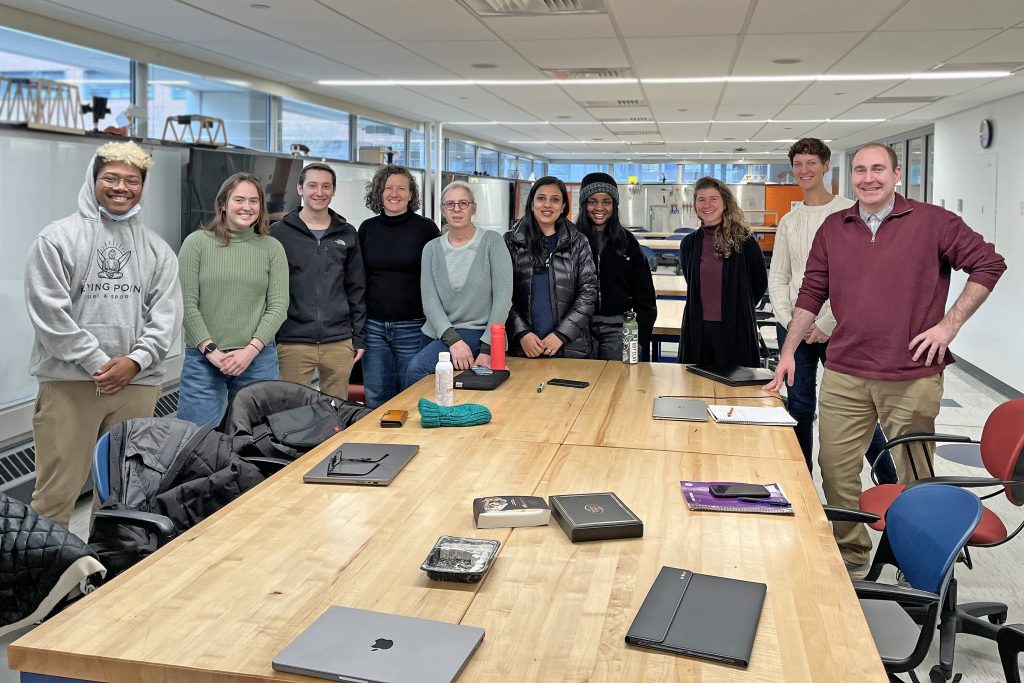College of Engineering Offers New Ph.D. Program in Engineering Education
Connie Syharat recognizes that not all students learn the same way. As one of the College of Engineering’s first graduate students to pursue a Ph.D. in engineering education, she’s hoping to bring awareness to neurodiversity in engineering and celebrate the strengths and potential of all students.
“I am deeply committed to work that advances students’ right to equitable and inclusive education in engineering and other STEM fields,” she says. “After graduating, I hope to continue my research on inclusive learning environments in engineering education.”

Syharat, who is working towards a concentration in accessibility and human rights, is one of six graduate students who are enrolled in the newly-launched Engineering Education Ph.D. program.
Through its coursework and research programs, students learn skills and competencies to conduct high quality interdisciplinary educational research though an engineering lens. Graduates will be well-qualified to work in academic, industrial, or governmental settings, and excel at identifying, creating, and expanding connections between engineering and the social sciences.
Desen Özkan, assistant professor of chemical and biomolecular engineering (CBE), spent the past year developing the new Engineering Education Ph.D. curriculum with Daniel Burkey, associate dean of undergraduate education and diversity, Castleman Term Professor in Engineering Innovation, and associate professor of chemical and biomolecular engineering.
The idea of engineering education goes back at least 125 years to the foundation of its professional society, now called the American Society for Engineering Education. At this time, academic leaders began thinking more intentionally about what an education in engineering should entail.
“Since then, the engineering profession and the curriculum have undergone several changes that reflect societal and technological shifts and priorities,” Özkan explains. “Engineering education research today connects historical precedents of curricular change like engineering science courses, engineering design courses, liberal education courses for engineers to inquiries of research on topics like computational thinking, diversity of who can become an engineer, considerations of equity in engineering, conceptual learning, engineering ethics, examining engineering values in society, and many more important topics.”
In the last 20 years, the field of engineering education developed into a research-focused discipline that has been supported by several National Science Foundation initiatives in the professional formation of engineers and STEM education divisions.
To earn the Ph.D., students are required to complete 30 credits of graduate coursework, of which 12 credits must be earned from the Engineering Education core. The courses ENGR 5610: Foundations in Engineering Education Research, ENGR 5620: Power and Politics of Engineering Education; and a theory in education course are required. Additionally, Ph.D. students must maintain a cumulative GPA of at least 3.0 across all coursework and prepare and publicly defend their Ph.D. dissertation.

“Engineering education as a discipline has been blossoming around the country, with several new programs at R1 universities in the last several years, following in the footsteps of long-standing programs at Purdue and Virginia Tech,” says Burkey, who serves as interim director of the new Engineering Education Ph.D. program. “UConn’s new program is one of the few engineering education graduate programs in the Northeast United States and takes advantages of the strengths of both the College of Engineering and the Neag School of Education.”
Like Syharat, engineering education Ph.D. student Mikayla Friday is involved in UConn’s program for neurodiverse engineers and understands that students learn differently. While studying environmental engineering at the University of South Florida, she encountered more rigidity in engineering courses than creativity. That was, until her perspective changed due to one passionate professor, who was “extremely effective at transferring knowledge,” Friday recalls.
“Now, I am passionate about ensuring that engineering is effectively taught, and that the curriculum is accessible to a neurodiverse community of students. The rigid and dated teaching methods of engineering are currently hindering societal progress and excluding many groups of potential engineers. I believe that the introduction of engineering education programs is an important step in the right direction, and I am happy to be a part of the program at UConn,” she says.
Similarly, chemical engineering major Landon Bassett ’18 (ENG), ’21 MS sought a more creative approach to teaching and learning engineering topics.
From a young age, Bassett expressed an interest in both gaming and education. He questioned if educational games could provide an alternative way to learn, as opposed to classroom lectures.

“There are a lot of brilliant people out there; just because they don’t fit in the current schooling style does not make them any less smart,” Bassett says. “What if we could make learning fun? If games could lower the bar for learning difficult topics, then wouldn’t more people be able to clear it?”
Bassett, who is now pursuing a Ph.D. in engineering education, explored the idea of educational gaming during his first undergraduate research project. Under the guidance of faculty advisor Burkey, Bassett created a card game designed to help engineers make more ethical decisions.
“This was exactly the type of research that I was looking for. It was an absolute blast not only creating the game, but watching students play it,” he recalls. “From there, I knew what I wanted to do: design educational games. Joining the engineering education program just made sense.”
As part of his MS degree, Bassett developed an air pollution board game that incentivized players to think about air pollution in their own neighborhoods, and he’s currently helping develop an adventure game called “Mars! An Ethical Expedition” that presents situated ethical scenarios. With fellow Engineering Education Ph.D. student Tori Wagner and support from a team of dedicated undergraduates, a revised Mars! game will go live in spring 2025 and be played by first-year students in the introductory engineering course ENGR 1166.

This semester, Özkan is teaching the Foundations in Engineering Education Research course, which is also open to graduate students across the university who are interested in the theory and practice of engineering education.
“Pedagogically, my goal in designing and leading this class is to help students think expansively about engineering, education, and learning in ways that can inform their work as a scholar, a teacher, and a student,” she says. “Students learn to critique and synthesize engineering education research in higher education, K-12, non-profits, and private industry settings; synthesize information at the intersection of engineering and the social sciences; and bring sociocultural and critical perspectives to engineering contexts through a focus on justice, diversity, equity, and inclusivity.”
Syharat, who is currently enrolled in Özkan’s course, finds parallels and meaningful contexts between the coursework and her current experiences at UConn. While working on her doctorate part-time, Syharat serves as program manager for Include, an NSF-funded project aimed at building a radically inclusive culture in the Civil and Environmental Engineering Department, and as a research assistant for a NSF Innovations in Graduate Education project aimed at encouraging the participation of neurodiverse students in STEM graduate programs to enhance the creativity and productivity of the professional workforce.
“My immersion in transformative engineering education projects over the past several years makes the engineering education Ph.D. program a natural fit for me, as I have already been deeply engaged with the engineering education community,” Syharat explains. “Our weekly readings and discussions [in Özkan’s class] have added depth and nuance to my understanding of the formation and evolution of the field — knowledge that is key for developing innovative approaches with the potential to make meaningful change in engineering education programs,” Syharat explains.
Graduate student Chiamaka Nwabanne came to UConn after completing a bachelor’s degree in communication engineering and a master’s degree in electronic and computer engineering from Nnamdi Azikiwe University in Nigeria. Like Syharat and Bassett, she’s enrolled in the Foundations in Engineering Education Research course and is pursuing a Ph.D. in engineering education.
“An engineering education degree will equip me with diverse and transferable skills—research, critical thinking, communication, problem-solving, and project and personal management—that can be applied to various roles within and beyond academia.” — Chiamaka Nwabanne

“An engineering education degree will equip me with diverse and transferable skills—research, critical thinking, communication, problem-solving, and project and personal management—that can be applied to various roles within and beyond academia,” Nwabanne says. “I am open to new and exciting opportunities in this field.”
Fayekah Assanah, assistant professor in residence in biomedical engineering, is teaching the one-credit Ph.D. program courses ENGR 5410: Scientific Communication, ENGR 5420: Engineering Internships and Careers in Industry, and ENGR 5430: Teaching Engineering: Communication and Pedagogy. And next spring, Özkan will teach the Power and Politics of Engineering Education.
“This class is really different from those offered in other engineering education Ph.D. programs and helps students contextualize their interests in engineering education with histories and power dynamics that have shaped the tensions we see in the present,” Özkan says.
Interest in the new program from students both inside and outside UConn has been high, and Burkey and Özkan are optimistic that the program will continue to grow over time.
“We’re very excited at the response we’ve had in our first year of the program,” Burkey says. “Several other students are taking the foundational courses and considering transferring in from other engineering graduate programs as engineering education better aligns with their interests and career goals. We’re looking forward to recruiting in the upcoming cycle and continuing to grow and provide a home for students interested in this kind of work.”
For more information, visit the Engineering Education Ph.D. Program webpage.
Latest UConn Today
- UConn Entrepreneur Aims to Revolutionize Men’s Health CareReza Amin’s Bastion Health creates virtual, confidential, progressive approach to medical screening to help save lives
- UConn’s Sir Cato T. Laurencin Recognized as Springer Nature Editor of DistinctionSir Cato T. Laurencin, MD, Ph.D., K.C.S.L, has received a 2025 Springer Nature Editor of Distinction Award. The award is given to exceptional editors who have demonstrated commitment to upholding scientific accuracy and advancing discovery.
- UConn Health Minute: Two Lives, One TeamAn expectant mom learned she suffered a life-threatening condition. But the high risk pregnancy team at UConn Health had the expertise to keep mom safe as she delivered a healthy baby.
- Overcoming Engineering Challenges Was No Problem for This Student TeamA joint mechanical and electrical and computer engineering Senior Design team tackled various problems in the midst of an electric boat competition
- Beautiful Moments: SFA Alum Brings Smiles to Bridal Couples with Live Event PaintingWhen Erin Leigh Boughamer '94 (SFA) left UConn three decades ago with a degree in graphic design from the School of Fine Arts, event painting hadn’t yet become part of bridal vocabulary. To ask her back then if she foresaw herself with a wardrobe of dressy pantsuits, each with at least a little dollop of acrylic paint on them, she’d have said no way
- Kumar Venkitanarayanan Named Interim Dean of UConn’s College of Agriculture, Health and Natural ResourcesVenkitanarayanan is a leader in the field of egg and poultry meat safety and has served in several leadership roles within the University













